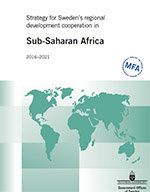Strategy for Sweden’s regional development cooperation in Sub-Saharan Africa 2016-2021 Reference No.: Article no: UD 16.034
Published

Within the framework of this strategy, Swedish development cooperation with sub-Saharan Africa is to contribute to increased regional integration and strengthened capacityto face cross-border challenges and opportunities at regional level.
Download:
The strategy will apply for the period 2016–2021 and comprises a total of SEK 2 700 million, of which SEK 2 670 million is intended for activities implemented by the Swedish International Development Cooperation Agency (Sida) and SEK 30 million is intended for activities implemented by the Folke Bernadotte Academy (FBA).
Within the framework of the strategy, Sida is expected to contribute to:
A better environment, sustainable use of natural resources, reduced climate impact and strengthened resilience to environmental impact, climate change and natural disasters
• Strengthened capacity of regional actors to work towards sustainable management and use of common ecosystem services and natural resources
• Strengthened capacity of regional actors to work towards increased resilience against climate change and natural disasters, including capacity for food security
• Increased production of, and access to, renewable energy
Strengthened democracy and gender equality and greater respect for human rights
• Enhanced capacity of regional actors to work towards strengthened democracy and the rule of law, gender equality and increased respect for human rights, with a focus on the rights of women and children
• Enhanced capacity of civil society and media to work towards accountability and respect for human rights at regional level
Better opportunities and tools to enable poor and vulnerable people to improve their living conditions
• Strengthened opportunities for increased economic integration and trade
• Improved conditions, especially for women and young people, for productive employment with decent working conditions
• Strengthened capacityof regional actors to work towards sustainable solutions concerning refugee situations and migration flows, and embrace the positive effects of migration
Human security and freedom from violence
• Strengthened capacity of regional actors for peace and reconciliation
• Strengthened capacity of regional actors to combat violent extremism
• Increased influence and participation by women and young people in processes for peace and reconciliation
Within the framework of the strategy, the FBA is expected to contribute to:
• Strengthened capacity for regional actors to prevent, resolve and deal with the effects of armed conflict
• Strengthened capacity for regional actors to implement the UN Security Council resolutions on women, peace and security

 X
X